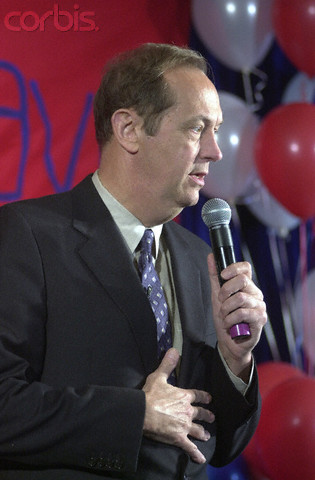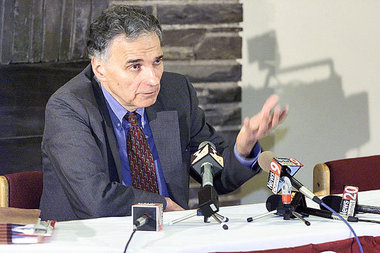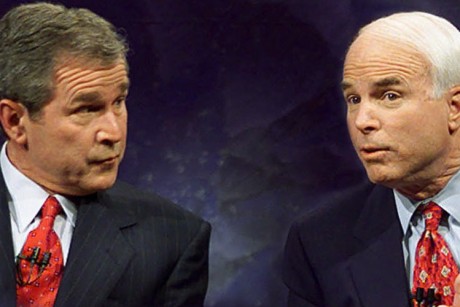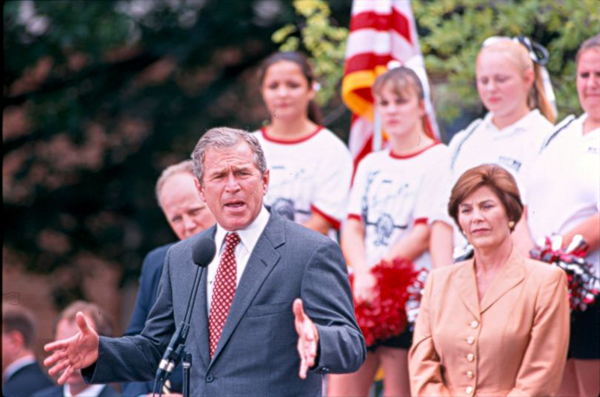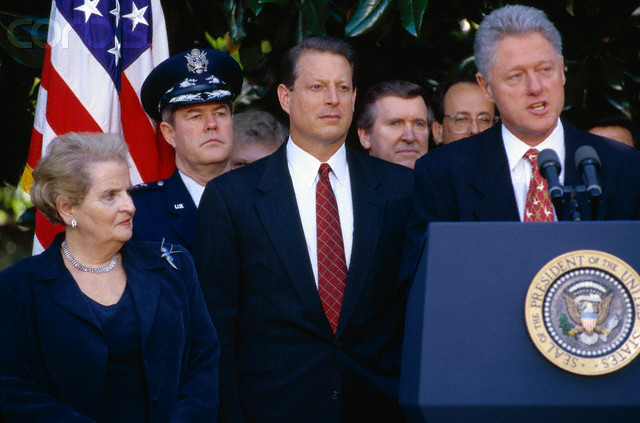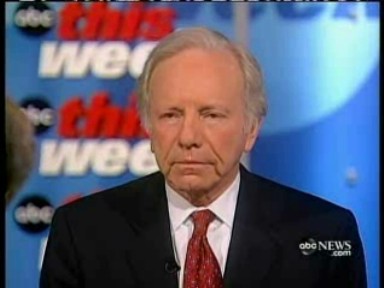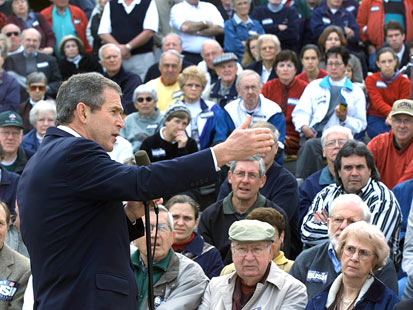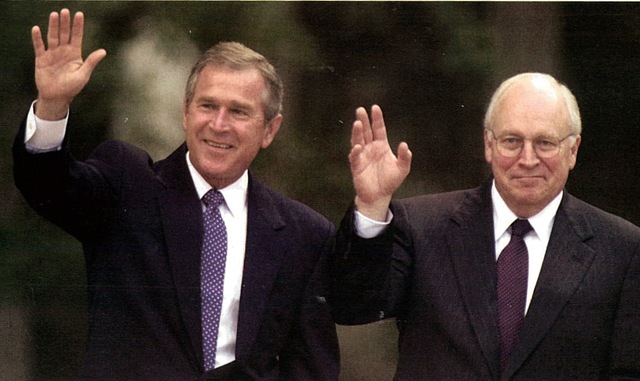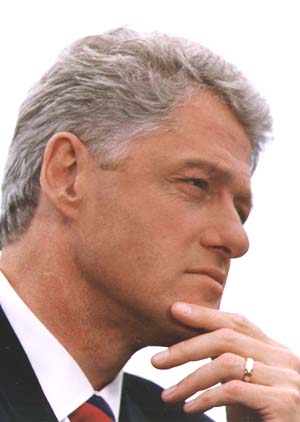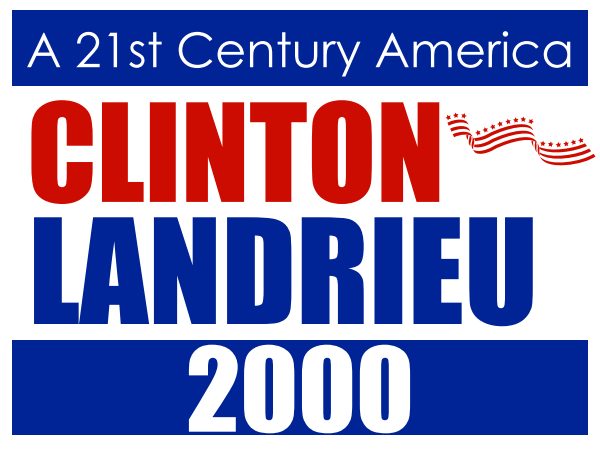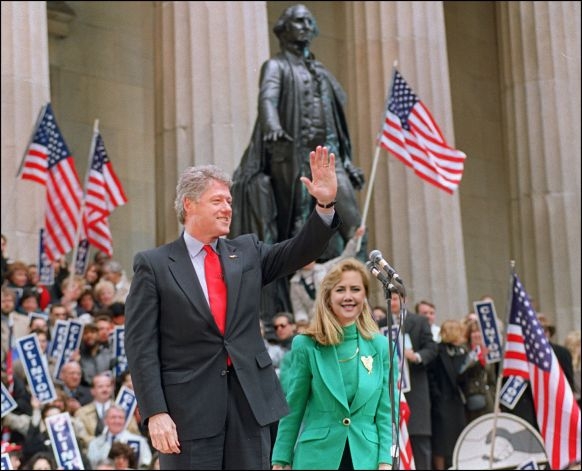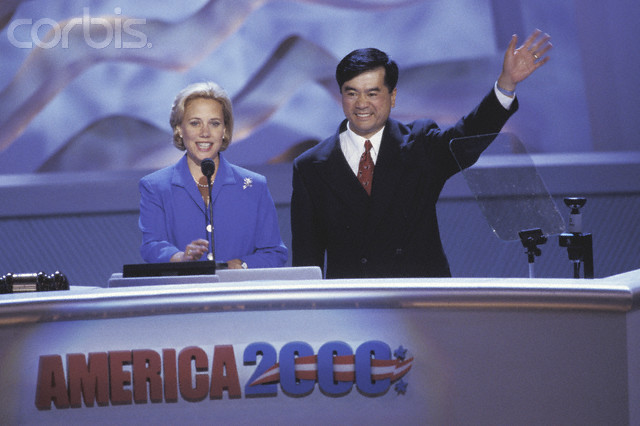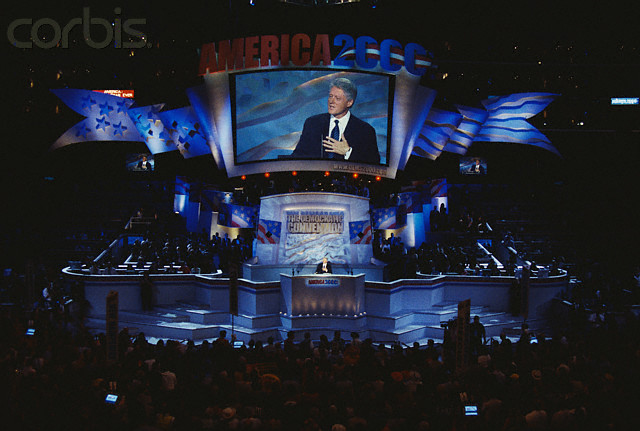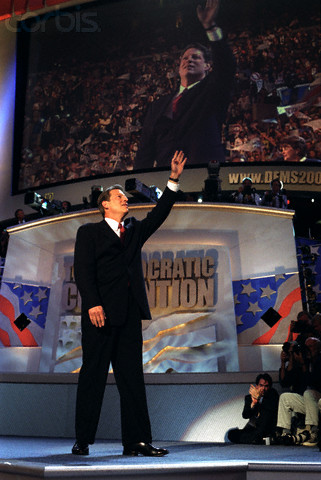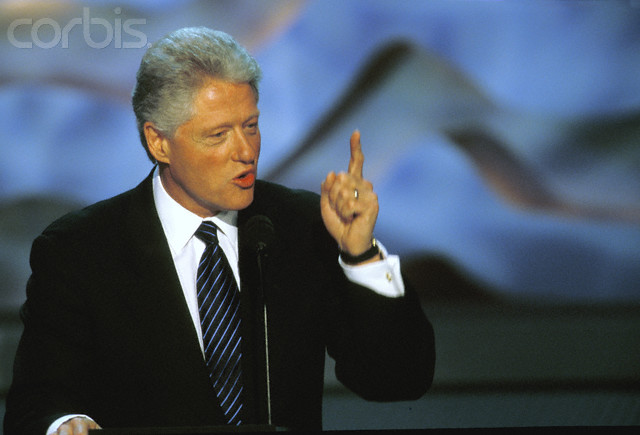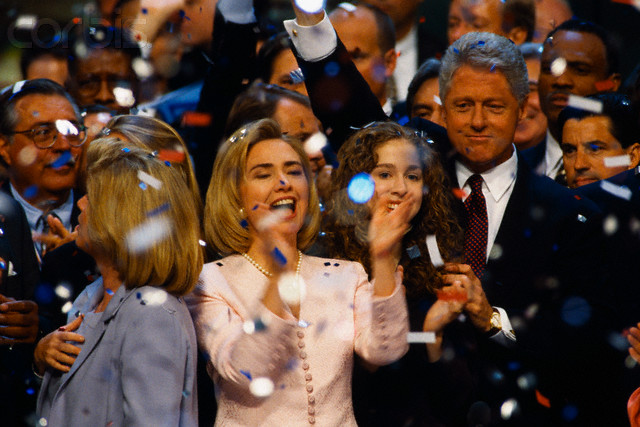CLINTON LEADS BRADLEY BY 15 IN NEW HAMPSHIRE
President looks for decisive blow with big primary win
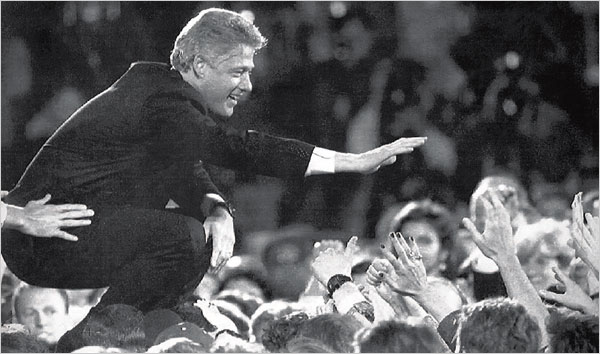
Bill Clinton greets supporters at a Nashua rally back in December
CLINTON HOLDS FINAL RALLY IN NEW HAMPSHIRE
Thousands greet president inside and out local high school

Campaign pushes ahead, despite struggles

NEW HAMPSHIRE PRIMARY RESULTS

MCCAIN & CLINTON VICTORIOUS IN NEW HAMPSHIRE
GOP primary turned upside down

BRADLEY HINTS AT ENDING CAMPAIGN
Disappointing finish leaves difficult path to nomination

Bill Bradley kisses his wife prior to his speech after losing the New Hampshire primary
President looks for decisive blow with big primary win

Bill Clinton greets supporters at a Nashua rally back in December
Clinton definitely had his mojo heading into the New Hampshire primary and he felt confident the campaign would not only pull out a victory, but a pretty decisive one at that. The general consensus was, at the time, beating Bradley by 10 or more points there would almost certainly cripple his campaign and deliver the President the nomination well before spring, which, around the time of Bradley's surge in the fall, looked downright unlikely.
But with the wind at his back, positive press from his big Iowa win, and more and more undecideds breaking his way, Clinton looked pretty unstoppable entering late January. - A 21st Century Campaign (John Sasso)
But with the wind at his back, positive press from his big Iowa win, and more and more undecideds breaking his way, Clinton looked pretty unstoppable entering late January. - A 21st Century Campaign (John Sasso)
CLINTON HOLDS FINAL RALLY IN NEW HAMPSHIRE
Thousands greet president inside and out local high school
"In two days, New Hampshire, we can make history. In two days, we can show the world, and our fellow citizens, that we are recommitting ourselves to a new, prosperous American 21st Century! In two days, we will be one step closer to envisioning what this journey has been all about. Together, New Hampshire, we can continue making America strong!"
- Excerpt from Bill Clinton's speech two days before the New Hampshire primary.
BRADLEY ZIGZAGS ACROSS NEW HAMPSHIRE SEARCHING FOR VOTES
Campaign pushes ahead, despite struggles

"One thing that I love about New Hampshire is your independent spirit. You buck national trends and do your own thing. It's why I'm confident, tomorrow, when the polls close, we will have shocked the world! We will have done something the media and the party bigwigs never thought possible - we will win! We will carry New Hampshire, our campaign will begin anew and it won't end until we claim victory this November!" - Excerpt from Bill Bradley's speech one days before the New Hampshire primary
NEW HAMPSHIRE PRIMARY RESULTS

Dan Rather: Good evening and welcome to CBS' coverage of the 2000 New Hampshire primary. It is now 7:00 on the East Coast and polls have closed in most of the precincts around the state. Based on exit polls, CBS can say that when all the votes are counted, President Clinton will easily win the Democratic primary. On the Republican side, at this moment, we cannot define the race except to say that Senator John McCain holds what appears to be a solid lead on Governor George W. Bush.
For President Clinton, tonight's victory very well could lock up the nomination for a historical third time. It has to be demoralizing for Senator Bradley, who invested so much time and energy into this state and failed, ultimately it appears, to not only win - but even remain competitive.
On the Republican side, the fact John McCain leads in our initial counting has to be a concern for Governor Bush. They had hoped, maybe beyond hope with what the polls were showing, that this race would ultimately end here in New Hampshire. That does not, however, appear to be the case. Though I want to quantify that comment with the fact that we are characterizing tonight's race based on exit polls, not actual raw vote totals.
I am now joined by Bob Schieffer, who has pored over the exit poll numbers and he has some insight into why McCain is leading at this time. Bob?
Bob Schieffer: Well Dan, John McCain has built his lead, and potential victory, on the backs of independent voters. In fact, if the exit polls hold, George Bush will actually have won a plurality of Republican support over McCain, but because McCain has done so well among independent voters, and remember, New Hampshire is an open primary, he was able to erase Bush's lead among party voters and build a substantial overall lead on his own.
What this means is that if you're the Bush campaign, you've got to feel at least some displeasure in the fact that you're potentially losing tonight not because your own party, the nomination of which you are seeking, I might add, is voting against you - but other non-party members, maybe men and women who voted for Bill Clinton in '96, and plan on voting for him again this November, are the ones doing the damage here tonight.
Dan Rather: And what about Bill Clinton? How did he win here tonight?
Bob Schieffer: Well Bill Clinton won almost across the board. The most interesting numbers, and we'll display them on your screen in a second, is that 45% of those voters who voted in the Democratic Primary tonight do not believe President Clinton should seek a third term. Slam dunk, if you will, for Bill Bradley - right? Wrong. Of those 45% who do not believe Bill Clinton should seek a third term, more than half eventually ended up voting for Bill Clinton anyway. Go figure.
Dan Rather: I guess there's somethin' to say about being decisive on being indecisive.
Bob Schieffer: That's what it's looking like, Dan.
Dan Rather: We do have a call to make. It's official. John McCain has won New Hampshire. A huge victory for McCain - a gigantic victory, if you will. This recharges his campaign. This brings him back to life. George Bush now has to fight like this is the O.K. Corral because this one ain't going to be easy.
John McCain and Bill Clinton, early winners tonight in New Hampshire.
For President Clinton, tonight's victory very well could lock up the nomination for a historical third time. It has to be demoralizing for Senator Bradley, who invested so much time and energy into this state and failed, ultimately it appears, to not only win - but even remain competitive.
On the Republican side, the fact John McCain leads in our initial counting has to be a concern for Governor Bush. They had hoped, maybe beyond hope with what the polls were showing, that this race would ultimately end here in New Hampshire. That does not, however, appear to be the case. Though I want to quantify that comment with the fact that we are characterizing tonight's race based on exit polls, not actual raw vote totals.
I am now joined by Bob Schieffer, who has pored over the exit poll numbers and he has some insight into why McCain is leading at this time. Bob?
Bob Schieffer: Well Dan, John McCain has built his lead, and potential victory, on the backs of independent voters. In fact, if the exit polls hold, George Bush will actually have won a plurality of Republican support over McCain, but because McCain has done so well among independent voters, and remember, New Hampshire is an open primary, he was able to erase Bush's lead among party voters and build a substantial overall lead on his own.
What this means is that if you're the Bush campaign, you've got to feel at least some displeasure in the fact that you're potentially losing tonight not because your own party, the nomination of which you are seeking, I might add, is voting against you - but other non-party members, maybe men and women who voted for Bill Clinton in '96, and plan on voting for him again this November, are the ones doing the damage here tonight.
Dan Rather: And what about Bill Clinton? How did he win here tonight?
Bob Schieffer: Well Bill Clinton won almost across the board. The most interesting numbers, and we'll display them on your screen in a second, is that 45% of those voters who voted in the Democratic Primary tonight do not believe President Clinton should seek a third term. Slam dunk, if you will, for Bill Bradley - right? Wrong. Of those 45% who do not believe Bill Clinton should seek a third term, more than half eventually ended up voting for Bill Clinton anyway. Go figure.
Dan Rather: I guess there's somethin' to say about being decisive on being indecisive.
Bob Schieffer: That's what it's looking like, Dan.
Dan Rather: We do have a call to make. It's official. John McCain has won New Hampshire. A huge victory for McCain - a gigantic victory, if you will. This recharges his campaign. This brings him back to life. George Bush now has to fight like this is the O.K. Corral because this one ain't going to be easy.
John McCain and Bill Clinton, early winners tonight in New Hampshire.
MCCAIN & CLINTON VICTORIOUS IN NEW HAMPSHIRE
GOP primary turned upside down
Final Results:
Democratic:
Republican:
Democratic:
- Bill Clinton: 65%
- Bill Bradley: 34%
Republican:
- John McCain: 49%
- George W. Bush: 30%
- Steve Forbes: 13%
- Alan Keyes: 6%
BRADLEY HINTS AT ENDING CAMPAIGN
Disappointing finish leaves difficult path to nomination
Bill Bradley kisses his wife prior to his speech after losing the New Hampshire primary
"I've long believed in the Democratic principles. Though President Clinton and I have differing views on some important topics, rest assured those differences are minor compared to our differences with the Republican candidates. This election is about bringing America securely into the 21st Century and none of those Republicans, from George W. Bush to John McCain, have the right mindset and ideas to do just that. Their policies, their commitments, run in opposition of what has brought our country out of the depths of a major recession and restored us once again as the most expansive, established and successful economy on the face of this earth.
So, even though we have lost tonight and the future is uncertain, I know, in the end, whether it's President Clinton taking the Oath of Office, or myself, we will continue to chart a positive direction for this great country. I thank you for your votes and your support and inviting me into your homes and businesses and, in some instances, treating me like a member of your own family. This experience has been extraordinary and humbling. I am grateful that I was given the opportunity to work for your vote, to ask for your vote and I hope, when you cast your ballot for me today, and when you caucused for me in Iowa last month, you did so proudly - because I am so very proud to count you all as my supporters. God bless you. God bless New Hampshire. And God bless the United States of America!" - Excerpt from Bill Bradley's concession speech after the New Hampshire primary
So, even though we have lost tonight and the future is uncertain, I know, in the end, whether it's President Clinton taking the Oath of Office, or myself, we will continue to chart a positive direction for this great country. I thank you for your votes and your support and inviting me into your homes and businesses and, in some instances, treating me like a member of your own family. This experience has been extraordinary and humbling. I am grateful that I was given the opportunity to work for your vote, to ask for your vote and I hope, when you cast your ballot for me today, and when you caucused for me in Iowa last month, you did so proudly - because I am so very proud to count you all as my supporters. God bless you. God bless New Hampshire. And God bless the United States of America!" - Excerpt from Bill Bradley's concession speech after the New Hampshire primary
Last edited:
